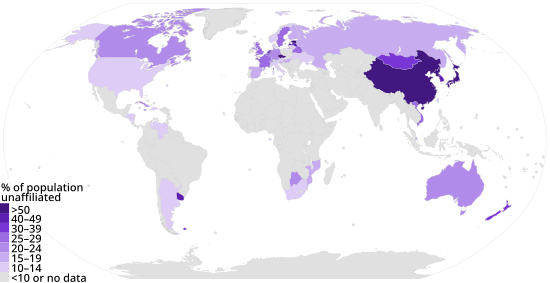무종교
종교를 믿지 않거나 소속되어 있지 않은 상태
무종교(중국어: 無宗敎, 영어: irreligion) 또는 무교(無敎)는 종교를 믿지 않음, 혹은 종교가 없거나 특정 종교 집단에 소속되어 있지 않은 상태를 뜻한다.

무신론과의 차이점
무신론과 많은 공통점이 있으나, 무종교가 단순히 종교 활동을 하거나 신을 숭배하지 않음을 의미하는 반면 무신론은 신의 존재나 종교 자체를 부정함을 의미한다. 검증되지 않은 믿음을 거부하는 합리주의 성향을 가진 무신론과 달리 무종교인이라 해도 체계적인 종교에 속하지 않는 도깨비나 드라큘라 등의 초자연적 존재를 믿을 수도 있다.
나라별 통계
| 나라별 무종교인 비율 | ||
| 국가 | 종교가 없다고 응답한 비율 | 출처 |
| 중국 | 59-93% | 여러 자료[1] |
| 에스토니아 | 75.7% | Dentsu Communication Institute Inc, Japan Research Center (2006)[2] |
| 아제르바이잔 | 74% | Gallup WorldView (2008)[3][4] |
| 알바니아 | 60% | US Department of State - International Religious Freedom Report 2006[5] |
| 체코 | 59%[8] | Czech Statistical Office (2001 census)[9] |
| 독일 | 59% | Worldwide Independent Network/Gallup International Association (2015)[10] |
| 대한민국 | 56.1% | Dentsu Communication Institute Inc, Japan Research Center (2006)[2] |
| 일본 | 51.8% | Dentsu Communication Institute Inc, Japan Research Center (2006)[2] |
| 러시아 | 48.1% | Dentsu Communication Institute Inc, Japan Research Center (2006)[2] |
| 벨라루스 | 47.8% | Dentsu Communication Institute Inc, Japan Research Center (2006)[2] |
| 베트남 | 46.1% | Dentsu Communication Institute Inc, Japan Research Center (2006)[2] |
| 네덜란드 | 44.0% | Social and Cultural Planning Office[11] |
| 스웨덴 | 43% | Zuckerman, Phil. "Atheism: Contemporary Rates and Patterns", chapter in The Cambridge Companion to Atheism, ed. by Michael Martin, Cambridge University Press: Cambridge, UK (2005)[12] |
| 헝가리 | 42.6% | Dentsu Communication Institute Inc, Japan Research Center (2006)[2] |
| 우크라이나 | 42.4% | Dentsu Communication Institute Inc, Japan Research Center (2006)[2] |
| 라트비아 | 40.6% | Dentsu Communication Institute Inc, Japan Research Center (2006)[2] |
| 벨기에 | 35.4% | Dentsu Communication Institute Inc, Japan Research Center (2006)[2] |
| 뉴질랜드 | 34.7%[13] | Statistics New Zealand (2006 census)[14] |
| 칠레 | 33.8% | Dentsu Communication Institute Inc, Japan Research Center (2006)[2] |
| 룩셈부르크 | 29.9% | Dentsu Communication Institute Inc, Japan Research Center (2006)[2] |
| 슬로베니아 | 29.9% | Dentsu Communication Institute Inc, Japan Research Center (2006)[2] |
| 프랑스 | 27.2%[15] | INSEE (2004 survey)[16] |
| 베네수엘라 | 27.0% | Dentsu Communication Institute Inc, Japan Research Center (2006)[2] |
| 슬로바키아 | 23.1% | Dentsu Communication Institute Inc, Japan Research Center (2006)[2] |
| 멕시코 | 20.5% | Dentsu Communication Institute Inc, Japan Research Center (2006)[2] |
| 리투아니아 | 19.4% | Dentsu Communication Institute Inc, Japan Research Center (2006)[2] |
| 덴마크 | 19% | Eurobarometer(2005)[17] |
| 오스트레일리아 | 18.7%[18] | Australian Bureau of Statistics (2006 census)[19] |
| 이탈리아 | 17.8% | Dentsu Communication Institute Inc, Japan Research Center (2006)[2] |
| 스페인 | 17% | Centre of Sociological Investigations (2005)[20] |
| 영국 | 16.8%[21] | UK National Statistics (2001 census)[22] |
| 캐나다 | 16.2% | Canada 2001 Census[23] |
| 아르헨티나 | 16.0% | Gallup-Argentina poll, April 2001[24] |
| 남아프리카 공화국 | 15.1% | Statistics South Africa Census 2001[25] |
| 미국 | 15.0%[26] | American Religious Identification Survey (2001), as reported by US Census Bureau[27] |
| 크로아티아 | 13.2% | Dentsu Communication Institute Inc, Japan Research Center (2006)[2] |
| 오스트리아 | 12.2% | Dentsu Communication Institute Inc, Japan Research Center (2006)[2] |
| 핀란드 | 11.7% | Dentsu Communication Institute Inc, Japan Research Center (2006)[2] |
| 포르투갈 | 11.4% | Dentsu Communication Institute Inc, Japan Research Center (2006)[2] |
| 푸에르토리코 | 11.1% | Dentsu Communication Institute Inc, Japan Research Center (2006)[2] |
| 불가리아 | 11.1% | Dentsu Communication Institute Inc, Japan Research Center (2006)[2] |
| 필리핀 | 10.9% | Dentsu Communication Institute Inc, Japan Research Center (2006)[2] |
| 브라질 | 7.4% | National Demografic Census in 2000, conducted by the IBGE.[28] |
| 인도 | 6.6% | Dentsu Communication Institute Inc, Japan Research Center (2006)[2] |
| 폴란드 | 6% | Public Opinion Research Centre (2007)[29] |
| 세르비아 몬테네그로 | 5.8% | Dentsu Communication Institute Inc, Japan Research Center (2006)[2] |
| 아일랜드 | 4.5% | Central Statistics Office Ireland Census 2006[30] |
| 페루 | 4.7% | Dentsu Communication Institute Inc, Japan Research Center (2006)[2] |
| 아이슬란드 | 4.3% | Dentsu Communication Institute Inc, Japan Research Center (2006)[2] |
| 그리스 | 4.0% | Dentsu Communication Institute Inc, Japan Research Center (2006)[2] |
| 터키 | 2.5% | Dentsu Communication Institute Inc, Japan Research Center (2006)[2] |
| 루마니아 | 2.4% | Dentsu Communication Institute Inc, Japan Research Center (2006)[2] |
| 탄자니아 | 1.7% | Dentsu Communication Institute Inc, Japan Research Center (2006)[2] |
| 몰타 | 1.3% | Dentsu Communication Institute Inc, Japan Research Center (2006)[2] |
| 이란 | 1.1%[31] | Dentsu Communication Institute Inc, Japan Research Center (2006)[2] |
| 우간다 | 1.1% | Dentsu Communication Institute Inc, Japan Research Center (2006)[2] |
| 나이지리아 | 0.7% | Dentsu Communication Institute Inc, Japan Research Center (2006)[2] |
| 방글라데시 | 0.1% | Dentsu Communication Institute Inc, Japan Research Center (2006)[2] |
